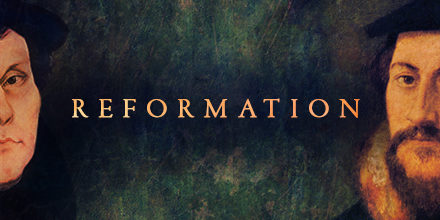
How to lead your worship service this Reformation Day – Soli Deo Gloria (Matthew Barrett)
In this series of posts we have explored what it might look like to devote 5 services around the 5 solas of the Reformation. In this last post we will tease this out with the doctrine of soli Deo gloria, to God alone be the glory. Out of all of the solas, this sola smoothly corresponds to worship itself where we are praising and glorifying our great God for what he has done to redeem us and what he is now doing to help us live for him. My hope, then, is that this last sola will bring things to a climax.
This Sunday my church will begin with a song of worship that is really meant to be a call to worship itself. The hymn is: “Brethren, We Have Met to Worship.” (I especially appreciate Michael Card’s version of this song.) However, before the song the worship leader will have the people recite together the first answer to the Westminster Larger Catechism:
Q 1: What is the chief and highest end of man?
Ans.: Man’s chief and highest end is to glorify God and fully to enjoy him for ever.
Could there be a more fitting way to start a service on soli Deo gloria?
 After this first hymn comes a reading from John Calvin on the glory of God in worship:
After this first hymn comes a reading from John Calvin on the glory of God in worship:
Shifty, slippery, inattentive is the mind toward thinking of God unless exercised by prayerful speech and song. The glory of God ought to shine in the various parts of our bodies, especially in the tongue, created to sing, speak forth, tell, proclaim the praise of God. And the tongue’s chief task is, in the public prayers offered in the assembly of believers, with one common voice, with a single mouth, to glorify God together, to worship him together in one spirit, one faith.
This paragraph by Calvin is followed by a prayer that voices the congregation’s desire to glorify God and praise him for the great redemption he has accomplished through his Son and applied by his Spirit.
After this reading from Calvin are two more songs of worship that fit the theme: “To God be the Glory” and Luther’s “A Might Fortress is Our God.” Since I have talked about the latter already, consider some of the words of the former:
To God be the glory, great things He hath done,
So loved He the world that He gave us His Son,
Who yielded His life our redemption to win,
And opened the life-gate that all may go in.
As you can see, this classic hymn brings our minds to the very gates of this doctrine, soli Deo gloria, not focusing on what we have done but on what God has done through his Son in order to bring glory to his name.
After this hymn is our time to take our morning offering, accompanied by another hymn: “Holy, Holy, Holy.” Once again, this hymn exalts God, reminding us just how holy and righteous he is.
Then comes the scriptural reading, this time from Psalm 29. I won’t quote it all, but I do want you to hear the first couple verses which relate to soli Deo gloria:
Ascribe to the Lord, O heavenly beings,
Ascribe to the Lord glory and strength.
Ascribe to the Lord the glory due his name;
Worship the Lord in the splendor of holiness.
Finally, the sermon on soli Deo gloria is preached. While this sermon will eventually turn to the practical implications of the doctrine in one’s vocation, that is not the starting point. Rather, I will begin with how all the solas are wrapped up in this final sola, demonstrating that our redemption has as its primary purpose the glory of God’s name. Only then will we understand what it means to live for his glory in a God-centered way. Of course, I will start the sermon, as I have done with the others, by telling a story from the Reformation that focuses on this particular sola.
The service concludes with “To God be the Glory” once more, followed by a benediction from 1 Timothy 1:17, “To the King of the ages, immortal, invisible, the only God, be honor and glory forever and ever. Amen.”
I hope these posts on the 5 solas have been instructive. My hope is that they give you hope if you are a pastor of a church where these solas may never be talked about or studied. Perhaps they can be an avenue into which God himself ignites a fire in the hearts of your people for the gospel of our Savior, Jesus Christ.
Soli Deo Gloria!
Matthew Barrett (PhD, The Southern Baptist Theological Seminary) is Assistant Professor of Christian Studies at California Baptist University, as well as the founder and executive editor of Credo Magazine. Barrett is also Senior Pastor of Fellowship Baptist Church. He is the author and editor of several books, including Salvation by Grace: The Case for Effectual Calling and Regeneration. You can read about Barrett’s other publications at matthewmbarrett.com.
